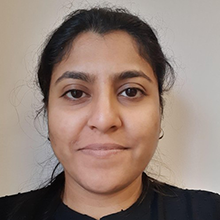Dr Purba Mukherjee
EPSRC Open Fellow
Visit Dr Purba Mukherjee's profile on the York Research Database to:
- See a full list of publications
- Browse activities and projects
- Explore connections, collaborators, related work and more
Profile
Biography
Purba received her PhD from SUNY Albany, US in 2014, working under the supervision of Janice Pata on studying the mechanisms of Y- and C-family DNA polymerases. Following a short postdoctoral period in the group of Professor Don Coen at Harvard Medical School working on HSV-1 replication, Purba was awarded an American Heart Association Postdoctoral Fellowship to design and synthesise DNA-programmed, activity-regulated and targeted plasminogen activators as therapeutics with Professor Reza Ghadiri, at Scripps Institute in La Jolla, California, US (2015 to 2019). She continued her training in therapeutic protein fibrinolytics under Professor John Griffin at Scripps (2019 to 2020). In March 2020 she joined as Assistant Professor in the Department of Biological Sciences at the Indian Institute of Science Education and Research, Kolkata India before moving her group to join the York Structural Biology Laboratory, within the Department of Chemistry when she was awarded a five-year EPSRC Open Fellowship. Purba’s research interests include DNA replication and repair processes, nucleic acids processing enzymes and chemoenzymatic biopolymer synthesis.
Publications
Selected publications
- Fagan SP, Mukherjee P, Jaremko JJ, Nelson-Rigg R, Wilson RC, Dangerfield T, Johnson KA, Lahiri I, Pata JD. (2021) Pyrophosphate release acts as a checkpoint during high fidelity DNA replication by the Staphylococcus aureus replicative DNA polymerase, PolC. Nucleic Acids Res. 49 (14), 8324–8338
- Mukherjee P, Leman LJ, Griffin JH and Ghadiri MR. (2018) Design of a DNA-programmed plasminogen activator. JACS 140 (45), 15516-15524
- Mukherjee P*, Wilson RC*, Lahiri I and Pata JD. (2014) Three residues of the interdomain linker determine the conformation and single-base deletion fidelity of Y-family translesion polymerases. J Biol Chem. 289(10):6323-31
- Mukherjee P*, Lahiri I*, Pata JD. (2013) Human polymerase kappa uses a template- slippage deletion mechanism, but can realign the slipped strands to favour base substitution mutations over deletions. Nucleic Acids Res. 41(9):5024-35
Research
Overview
Protein-primed replication; chemoenzymatic bioconjugates synthesis; protein and nucleic acid therapeutics
- Mechanistic studies of protein primed replication
- Chemoenzymatic synthesis of hybrid macromolecules
- Enzyme engineering for nanomachine assembly
- Peptide-oligonucleotide conjugate synthesis
Find out more about Purba's research
Replication forms the basis of survival and propagation of all organisms. Understanding the mechanistic processes governing replication provides a picture of how different organisms regulate genetic information transfer. In the Mukherjee lab, we study a unique mode of replication known as “protein-primed” replication only found in niche organisms such as bacteriophages, infectious human viruses and the biotechnologically important bacteria Streptomyces. Intriguingly, the ends of the linear replicons in these systems is protected by a covalently linked terminal protein that is incorporated during the initiation step of replication.
Our interest lies in understanding and answering how the protein-priming process occurs and what the rules of this essential process are. How does a specific protein become selected for this process from among the cellular milieu? What makes the enzymes that perform this function especially suited for this? Ultimately, we aim to utilise this unique functionality to design enzymes that are capable of being programmed to perform this activity on unnatural substrates. We also study DNA polymerases from various systems with novel nucleotide incorporation capabilities.
Our designer nucleic acids-modifying enzymes are focused on building nanomachines capable of synthesising various flavours of the nucleic acids therapeutics and biomaterials that are currently under development.
To achieve these goals the lab uses a toolkit of protein chemistry, peptide and oligonucleotide synthesis, pre-steady state and steady-state enzyme kinetics, molecular biology, in silico protein design and engineering.

Contact details
Find out more

